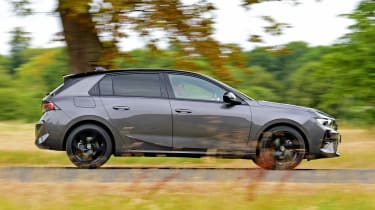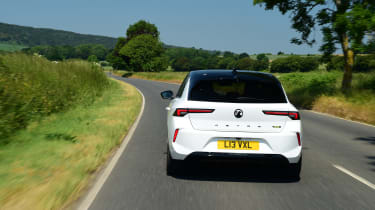Vauxhall Astra review - MPG, running costs & CO2
No Astra will be expensive to run, but electrified versions are welcome additions
Fuel efficiency is always a key consideration for a family hatchback, and the new Vauxhall Astra looks set to continue the low running costs that characterised the last version. But the last Astra’s problem was its heavy depreciation, as it lost a lot of its original value quite quickly.
It seems the new Astra will perform much better in this regard and, as a result, Vauxhall’s reasonable PCP finance prices look competitive with rivals, with incentives popping up on quite a regular basis.
Vauxhall has broadened the Astra engine range to offer more economical choices. New for this car are two plug-in hybrid models that are capable of 39 miles of pure-electric driving, plus there’s the first-ever Astra Electric, with a range of up to 260 miles.
Vauxhall Astra MPG & CO2
Despite lacking any kind of mild-hybrid assistance, the entry-level 1.2-litre petrol offering is decently economical; be gentle on the accelerator, and you can expect to return over 50mpg with the six-speed manual transmission – with the eight-speed automatic, efficiency is around 49mpg.
The mild-hybrid Astra fares much better, with impressive economy of over 59mpg in official figures. Go for the plug-in hybrid and you’ll get a lofty claim of 235mpg, but this isn’t realistic in real-world conditions, and you’ll have to keep it regularly charged up to come close to this figure. The GSe’s plug-in hybrid system is slightly less efficient with a figure of 217mpg.
Official CO2 emissions are lowest for the standard plug-in hybrid and the GSe (28g/km and 29g/km, respectively) making them the models of choice alongside the Astra Electric (zero emissions) for company-car buyers thanks to their low BiK (Benefit-in-Kind) rates.
Recharging from a 7kW home wallbox takes under four hours, or you’ll need around seven hours to charge from a standard three-pin socket. This may prove the best option, because installing a 7.4kW wallbox charger to your home will cost around £500 to £1,000.
Diesel was originally offered for the Astra, but it was discontinued in 2023. Find a nearly-new example and its promise of up to 65.7mpg should save high-mileage drivers money on fuel. It was more expensive to buy than petrol versions, though, and less well-suited to short, local trips.
You’ll also be needing a wallbox if you go for the Vauxhall Astra Electric, which previously had an even higher starting price of close to £40,000, but has now dropped to £35,000 in Griffin trim. Despite this hefty sum, very few people are likely to buy this model with cash, and Vauxhall is already offering some finance deals to bring the monthly costs down. It will also offer free VED (until 2025), but after this date it will incur the standard rate of tax as EVs will no longer be exempt.
The Astra Electric has a 54kWh battery capable of getting it up to 259 miles between charges, and it can be topped up from 20-80% in 26 minutes thanks to 100kW peak charging speeds. These are fairly competitive figures, and during our test drive of the Astra Electric during the summer months, its range figure seemed realistic. However, with no heat pump to boost efficiency in cold winter weather, we expect range to take a hit when the temperature drops.
Insurance groups
The cheapest petrol engine occupies group 17 out of 50 in entry-level trim, while the majority of 128bhp petrol models and mild-hybrid models are groups 19 and 20 depending on the trim. The plug-in hybrid in GS trim sits in group 24, while the Electric sits in group 25, but the most expensive model to insure is the sporty GSe in group 31.
Warranty
Vauxhall offers a pretty standard three-year/60,000-mile warranty, which matches the cover you get from Ford, Skoda and Volkswagen. High-mileage drivers may be better off with a Kia Ceed or Hyundai i30, which come with longer warranties with higher mileage limits.
Plug-in hybrid Astras get an eight-year/100,000-mile battery coverage in addition to the standard warranty, which covers the pack if it drops below 70% capacity in that time.
Servicing
Petrol engines need servicing every 12,500 miles or every year, whichever comes first. Discontinued diesels and the plug-in hybrids can go 20,000 miles or a year between services; you may need to top up the AdBlue in diesel engines between visits to the garage.
Taking out a Vauxhall Care plan includes three services and two years of roadside assistance. Your dealer will be able to advise on prices.











